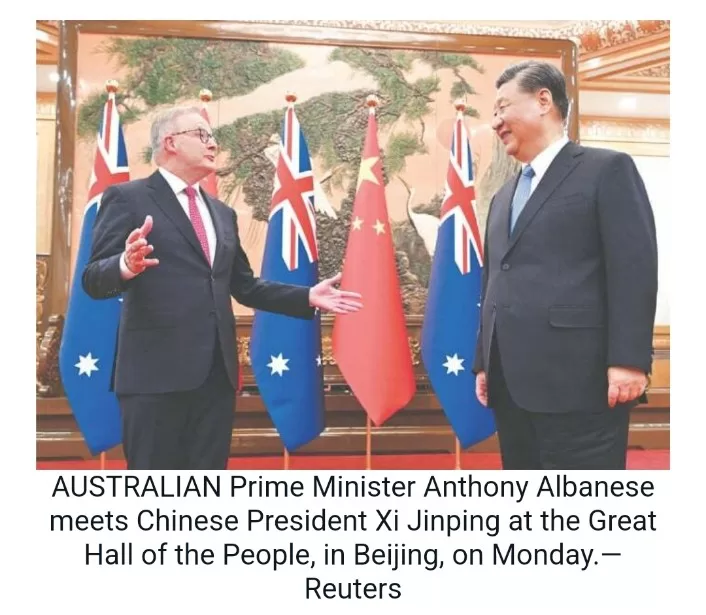Beijing – In a pivotal meeting at the Great Hall of the People in Beijing, President Xi Jinping of China and Australian Prime Minister Anthony Albanese affirmed the significance of a stable and mutually beneficial relationship between their nations, hinting at a desire to move past recent tensions.
During the discussions, President Xi articulated the need for China and Australia to enhance their strategic partnership, emphasizing the importance of nurturing mutual understanding and trust. Albanese, the first Australian leader to visit Beijing since 2016, echoed this sentiment, underscoring the potential benefits of a strong alliance. The meeting, which lasted over an hour, marked their second face-to-face encounter in a year.
For decades, China and Australia have cultivated a trade-dependent relationship, with China emerging as Australia’s primary trading partner, particularly in food and natural resource sectors. However, their ties deteriorated after Australia accused China of political interference in 2017 and subsequently banned equipment from Chinese tech giant Huawei due to national security concerns in 2018.
In 2020, Australia’s call for an international inquiry into the origins of the COVID-19 pandemic, which emerged in Wuhan, China, further strained relations, leading to Beijing imposing restrictions on various Australian imports.
Earlier on the same day, Prime Minister Albanese visited Beijing’s iconic Temple of Heaven, standing at the Echo Wall, where Gough Whitlam, Australia’s Prime Minister in 1973, posed for a photograph a year after diplomatic ties were established between the two nations.
President Xi Jinping expressed his gratitude, saying, “In China, we often say that when drinking water, we should not forget those who dug the well. The Chinese people will not forget Prime Minister Whitlam for digging the well for us.”
Albanese has made efforts to stabilize relations since becoming Prime Minister in May of the previous year, holding talks with Xi during a G20 summit in Indonesia in November. In response, China started to reduce trade barriers, including permitting coal imports in January and lifting tariffs on barley in August. In the latest development, Beijing agreed to reevaluate the hefty 218% dumping tariffs on Australian wine.
Albanese, when speaking to reporters after the meeting, expressed satisfaction with the progress, saying, “I noted that unimpeded trade is in the interest of both countries, benefiting Chinese consumers as well as Australian exporters. He certainly agreed that Australian wine is of exceptional quality.”
Albanese concluded the meeting with optimism, extending an invitation to President Xi to visit Australia. Nonetheless, several obstacles remain in the bilateral relationship. Australia’s support for a United Nations ruling against China’s territorial claims in the South China Sea has triggered tensions with Beijing, which maintains that this issue falls outside of Australia’s purview.
Australia contends that the South China Sea serves as a crucial trade route for its commerce with Japan and South Korea. Moreover, China’s increasing influence among Pacific island nations has raised concerns in Australia, while Canberra’s security alliance with the United States and Britain in the Asia-Pacific, known as AUKUS, has fueled apprehensions of containment within Chinese circles.
Although AUKUS did not explicitly surface during the discussions, Albanese revealed that they addressed regional stability. He noted the significance of establishing safeguards and military cooperation between the United States and China, emphasizing their importance in maintaining peace and security in the region.
By Reuters




